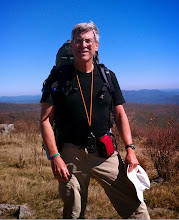When I hike, I enjoy so many things about it. The scenery, natural beauty, and exercise are always a big part of it. If I am by myself, I enjoy having the chance to think about things and having the solitude. If I am with friends, I enjoy the comradeship of a shared interest. And then there is the hope to see interesting wildlife. Some of my most memorable moments in hikes come from seeing animals. In my hikes in the last couple of months, I’ve seen a cottonmouth, a river otter, and a black bear. There was the time in Glacier National Park when I practically walked into a mountain goat, and the time in Yellowstone when a large bull bison blocked the trail and was clearly not going to move. There was the hike in Glacier, all alone, when I froze in mid-step when a VERY large animal snapped a twig very close by. I figured it was a large gizzly bear, but it ended up being a huge bull moose with antlers that looked like those of the extinct Irish elk. Then there was the hike in Shenandoah when I was paying more attention to my new GPS than the trail and nearly stepped on a timber rattler. And even on hikes where I saw no animals of any kind, there was the anticipation of what I might see around the next bend in the path, behind the next tree.

What makes this possible is biodiversity, the abundance of different types of animals and plants in the ecosystem. Imagine a world with minimal biodiversity. It would be like living in and never leaving a room that is painted gray, eating three bowls of gruel a day – same old, same old each day. The services that animals and plants provide is immense, under appreciated, and under valued. Our food supply and many medicines, and so many other products, are made possible through biodiversity. Clean water and removing carbon and pollutants from the air are services provided by ecosystems. And then there is the spiritual value. Can you imagine a world with only a few types of food plants and animals, and maybe the few species wild animals that have adapted to mankind? I can’t! I have never seen, and may never see, a polar bear, Siberian tiger, mountain gorilla, giant panda, orangutan, wolverine, or blue whale in the wild. But if the day comes when the last of these disappears forever from this earth, I cannot imagine feeling anything but incredible sadness.
We are losing our biodiversity at an incredible rate, 1,000 times the typical species extinction rate. And for the most part, this loss is caused directly by humans – over exploitation, habitat destruction, climate change, and pollution. The loss is incalculable, and may eventually lead to our own demise if more people do not think about and care about this. While politicians and powerful self interests squabble, deny, and say “who cares, it is only a bug (or a frog, or a tree, or a minnow, or a bird)?”, species are becoming extinct at a rate of about one every 20 minutes!
To read more of my thinking on this topic, including my homage to the little plant that helped to save my life, as well as the lives of thousands of others, go to my Racing for a Cure blog, on the topic of thanking the Madagascar periwinkle.









No comments:
Post a Comment